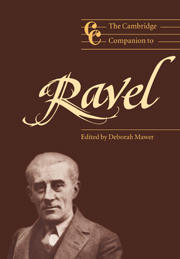Book contents
2 - Evocations of exoticism
from Part I - Culture and aesthetic
Published online by Cambridge University Press: 28 September 2011
Summary
Art is a beautiful lie.
ravelMy music is unequivocally French.
ravelFrench musical exoticism in the nineteenth century
On 8 December 1844 Félicien David's symphonic ode Le Désert took Paris by storm. Although David had actually travelled to the Far East as a member of the Saint-Simonian expedition to find a female Messiah in 1833, it was his imaginative translation of his exotic musical souvenirs into an acceptable Westernised format which led to their success. In fact, had he incorporated melodic augmented seconds, rediscovered modes and Glinka's new whole-tone scale within his pot-pourri of melodrama, pedal-points, arabesques, conventional chromatic harmony and bombastic choruses in praise of Allah, all the clichés of nineteenth-century musical exoticism would have been present, leaving successors such as Bizet and Delibes with only the prospect of subtle refinement of his ideas. Even the perceptive Berlioz was bowled over by David's achievement, and surprisingly more by the musical qualities of Le Désert than by its then-novel pseudo-orientalism. ‘A great composer has just appeared; a masterpiece has been unveiled’, he enthusiastically exclaimed. ‘David writes like a master: his movements are carved out, developed, and transformed with as much tact as science and taste, and he is a great harmonist. His melody is always distinguished, and he orchestrates extraordinarily well.’ The same accolade would have been far more justifiable had it appeared after the first performance of Ravel's Shéhérazade songs in May 1904, and if he never passed judgement on David's ‘masterpiece’ and had little respect for Berlioz as a composer, Ravel knew better than anyone that authenticity was far less important than imagination and technique when it came to a successful exotic representation.
- Type
- Chapter
- Information
- The Cambridge Companion to Ravel , pp. 27 - 46Publisher: Cambridge University PressPrint publication year: 2000
- 18
- Cited by



